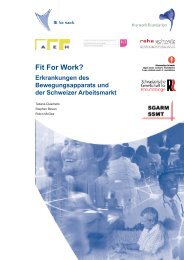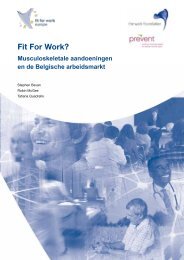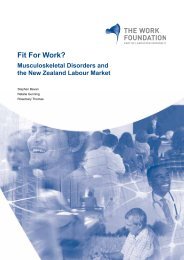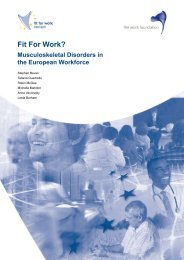FfW Bulgarian report (English language) - Fit for Work Europe
FfW Bulgarian report (English language) - Fit for Work Europe
FfW Bulgarian report (English language) - Fit for Work Europe
Create successful ePaper yourself
Turn your PDF publications into a flip-book with our unique Google optimized e-Paper software.
2001). The study also found that <strong>for</strong> men over the age of 40, the risk of developing a back<br />
disorder increased with obesity and heaviness of smoking.<br />
Up to 18.5 per cent of the <strong>Bulgarian</strong> population were aged over 65 in 2011, almost doubling<br />
the percentage in this age group since 1970 (Griva and Dikova, 2010). At the same time, the<br />
employment rate of older workers in Bulgaria (aged between 55 and 64 years) is one of the<br />
highest in the EU with 43.5 per cent in employment and an average exit age of 64.1 (Eurofound,<br />
2007a). As the study above suggests the risk of developing MSDs increases with age, there<strong>for</strong>e<br />
special attention is required <strong>for</strong> the job design of older employees.<br />
An emerging health issue in Bulgaria is the prevalence of obesity – a risk factor <strong>for</strong> bone<br />
and joint conditions (as well as cardio-vascular disease and diabetes). However, there is no<br />
extensive data on this issue. One study estimated the prevalence of being overweight and<br />
obese among urban adults 30-60 years of age, tracking differences between income and gender<br />
groups. They observed that the likelihoods of being overweight and obese were greater among<br />
men than women (44.8 per cent vs 32.4 per cent, and 6.0 per cent vs 4.7 per cent respectively),<br />
and that BMI decreased as income increased (Ivanova, Dimitrov, Dellava and Hoffman, 2008).<br />
Similar proportions were found by the <strong>Europe</strong>an Health Interview survey (2008): 56.7 per cent<br />
of men and 43 per cent of women were overweight, of which 11.3 per cent of men and 10.9 per<br />
cent of women were categorised as obese. If <strong>Bulgarian</strong> trends mirror those in <strong>Europe</strong>, obesity is<br />
likely to be a growing problem.<br />
As well as increasing the risk of obesity, low levels of exercise may aggravate the severity of<br />
MSDs, in particular back pain (Viir, Virkus, Laiho, Rajaleid, Selart et al., 2007). According to<br />
an EU survey (<strong>Europe</strong>an Commission, 2010) Bulgaria is among the <strong>Europe</strong>an countries with<br />
the lowest levels of physical activity: only 3 per cent of <strong>Bulgarian</strong>s partake in regular sport<br />
or exercise, citing time as the most common reason. However, 40 per cent were <strong>report</strong>ed to<br />
engage in a physical activity outside of sport such as cycling or gardening.<br />
Smoking has been found to have an impact on the progress of RA disease (Bone and Joint<br />
Decade, 2005). The proportion of daily adult smokers in Bulgaria is amongst the highest in<br />
<strong>Europe</strong> at 32.3 per cent of the population. 16 Further risks are associated with exposure of<br />
children and non-smokers to environmental tobacco smoke (WHO, 2009).<br />
Steps towards improving physical health amongst the <strong>Bulgarian</strong> population have begun with<br />
funding from WHO. The National Centre of Public Health and Analyses undertook an audit of<br />
16 Eurostat<br />
<strong>Work</strong> and MSDs in Bulgaria<br />
<strong>Fit</strong> For <strong>Work</strong>? 29







